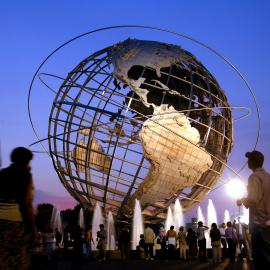To the Editor:
Too little attention has been paid to the dark consequences of free trade, and too many misunderstandings of organized labor's positions on trade matters have been spread. So the recent article by Jay Mazur, president of the Union of Needletrades, Industrial, and Textile Employees, was welcomed. It is regrettable, however, that Mazur did not define the "new internationalism" beyond suggesting that it is based on "new alliances" with "environmentalists, human rights groups, and religious and consumer activists."
The American labor movement has always been involved with the well-being of workers in other lands. Its first resolution on foreign policy, adopted in 1882, condemned England's unjust treatment of Ireland and expressed solidarity with Irish farm laborers. It was Samuel Gompers, the American Federation of Labor's first president, who convinced President Woodrow Wilson of the need to create the International Labor Organization within the League of Nations -- the league's only surviving component today. From 1932 on, American labor sparked the campaign to alert the world to the dangers of Hitler's totalitarianism and to save the leaders of the unions that he dissolved within days of taking power -- a campaign led by the former president of Jay Mazur's union, David Dubinsky.
After World War II, organized labor helped rebuild democratic trade unions in Europe. It identified itself with the nascent trade unions of North Africa, the Caribbean, and elsewhere in their struggles to end colonialism, as well as with the efforts of displaced Jews to create a homeland in Israel. Later, American labor fought apartheid, supported the formation of black trade unions, and was among the first American organizations to support sanctions against Rhodesia in the 1970s and later against South Africa. In more than 50 countries, the AFL-CIO helped workers develop independent unions to protect and advance their interests, both on the job and in civil society. It was a relentless foe of all forms of totalitarianism. It had and still has only one test by which to judge a nation: Is a free and democratic union movement allowed to function there?
Against this background, Mazur writes that in the post-World War II years the international role of the labor movement was "more geopolitical than industrial" and was defined "mainly through the prism of anticommunism." Although this artful writing is not intended to demean the efforts of American unions to help workers everywhere have free and independent unions, it does so nonetheless. Mazur's article supports those who denigrate labor's international defense of free, democratic unions and those who now suggest that anticommunist activity was somehow less than honorable.
It suggests that these were cynical struggles for geopolitical power in which labor was a pawn of the government, rather than efforts to ensure that workers could defend their interests. When David Dubinsky and his colleagues fought for free unions, they were no one's pawns. When American labor's Michael Hammer and Mark Perlman, and Rodolfo Viera, president of the Salvadoran Peasant Workers' Union, were gunned down in San Salvador as they tried to advance the land distribution program, their struggle was between rich landowners and workers. Many more examples illustrate that American labor's engagement with other unionists has been premised on the determination to ensure, as the late AFL-CIO President Lane Kirkland put it, that "ordinary people don't get kicked around by the rich and powerful."
Mazur's article suggests that today's unions are engaged in the new internationalism as a matter of self-protection and that "following the work" as it moves to other countries is necessary to protect American workers. To some extent this is true, but the labor movement was helping workers abroad for reasons of solidarity and humanitarianism long before the movement of work became significant. The labor movement has argued for the inclusion of workers' rights in every international trade negotiation since the Tokyo Round of the 1970s. Current efforts to ensure respect for core labor standards around the world come from the same inspiration.
Mazur properly highlights the need for U.S.-based corporations to take a hard look at not only their behavior abroad (in terms of wages, conditions, workers' rights, and environmental issues) but at the places they invest their money. A study released last November by the New Economy Information Service found that the developing democracies' share of total developing-country exports to the United States (excluding oil) fell from 53.4 percent in 1989 to 34.9 percent in 1998. In terms of manufactured goods exported to the United States -- vital to a developing country's economic success -- developing democracies' share fell by 21.6 percent, to 35.1 percent. U.S. direct investment in manufacturing in developing democracies remained largely stagnant while nondemocratic countries (mainly China) gained 5.7 percentage points.
If American corporations are as serious about their commitment to democracy as American unions are, they must be willing to work with developing democracies toward economic development that truly improves working conditions through respect for workers' rights and decent wages. These corporations can help ensure the development of democracy throughout the world and, at the same time, make consumers out of decently paid workers.
Thomas R. Donahue
Former President, AFL-CIO
